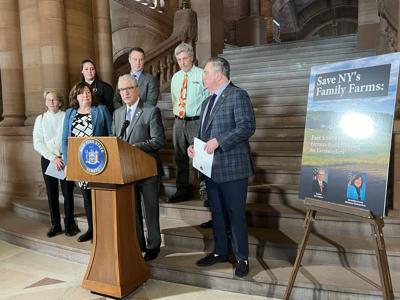STATE CAPITOL — State Sen. James Tedisco and Assemblywoman Marianne Buttenschon have introduced bi-partisan legislation to expand a state tax credit to include the construction of affordable housing for farm workers.
The bill would expand the state’s 20% Investment Tax Credit passed last year, which offsets the costs of machinery, equipment and other building construction for family farmers. If passed, farm owners would also receive the tax credit to build on-site affordable housing buildings for farm workers. Speaking at the state Capitol on Thursday, Tedisco, R-Saratoga Springs, said the state’s farming industry is one of its most significant and important industries.
“Family farms are not only vital to the economy and vitality of the state, but also to the food security of New York by producing a large portion of the food residents need close to their home,” he said, adding that the affordable housing incentive would also entice people to become much-needed farmworkers.
“If this goes and gets into place and passes — and I think it's a no brainer, it's just common sense — they're going to say to themselves, ‘Well, I thought about working on a farm, wait a second, they're going to provide affordable housing for me? I'm going to sign up. I want to work for the farm, I need housing,’” Tedisco said. “So, you're going to get incentivization of individuals for the dearth of farm worker needs.”
According to the New York State Farm Bureau, between 2017 and 2022, the state lost 2,800 family farms and lost 364,000 acres of farmland. New York farms employ more than 56,000 people and, among all sectors of agriculture, are responsible for nearly 200,000 jobs throughout the state.
Jeff Williams, public policy director for the New York Farm Bureau, said the legislation is a top priority for the organization this year.
“We're so grateful for this refundable investment tax credit. It's a five-year window where farmers can get 20% back on their investments on their farm operation. That's not just economic stability, but its governmental stability, as well. Everybody craves stability," he said. "We have seen farms across the state invest in their farms — new milking parlors, new tractors, new equipment. It's really a way to get farms back on their feet in this day and age. Unfortunately, there's a loophole in that program where farm housing isn't included. You can house chickens in a barn and get 20% back, but you can't house employees in high-quality housing under this tax credit. This bill fixes that issue once and for all.”
Tedisco noted the state’s increasingly unpredictable weather also means farm workers must be on-hand to address the temperature changes and mitigate them.
“Our farmers deal with that unpredictability. They can deal with it in a better way when you have 67 degree weather a couple of days ago, and then today, it's in the 30s — with the wind probably into the 20s — [and] we had snow drifts,” he said. “When you get those freezes, when you get a heatwave in an unexpected time of the year when it shouldn't be there or freeze, you need those farm workers close by on hand to mitigate that. This helps in that way.”
Tedisco and Buttenschon also agreed the legislation could help the state’s migrant crisis. Gov. Kathy Hochul has repeatedly referenced farms are facing a shortage of thousands of farm workers and the asylum seekers could play a role in filling that need.
“Here's a chance for them to not only get jobs — and farmers do use migrant workers — but also provide them a better setting, an affordable house, while they're working here on those farm properties. So, yes, that's another byproduct of how it would help with the migrant issue if they're going to be here,” Tedisco said.
Buttenschon, who owns a tree farm in Oneida County, said she has seen firsthand how farm work is not for everyone.
“And workforce housing is so important for those individuals who choose to be a part of this profession, because it isn’t for everyone. I have a Christmas tree farm and we know that some folks get there and it’s not for them. It’s hard work, it’s dedication,” the Democrat said.
Both state lawmakers said they are hopeful the legislation can be included in this year’s state budget and Tedisco said he would be willing to allow someone from the opposite side of the aisle to sponsor the bill if it means it makes it past the finish line.
“If one of my colleagues thinks they could do a better job carrying this bill [and] can promise me they will get it passed, I'll take my name off it and I'll put their name on it and sometimes it takes doing that,” the Republican said. “It should be a no brainer for Democrats and Republicans and the like of all of us. So, we hope it gets passed sooner than later.”
Kevin Bowman, owner of Bowman Orchards in Clifton Park, said he would like to see both sides come together to work on the issue.
“And wouldn't that be unique in New York just to see us all work together in a common goal to once again make New York the Empire State in something good and something positive?” Bowman asked.









